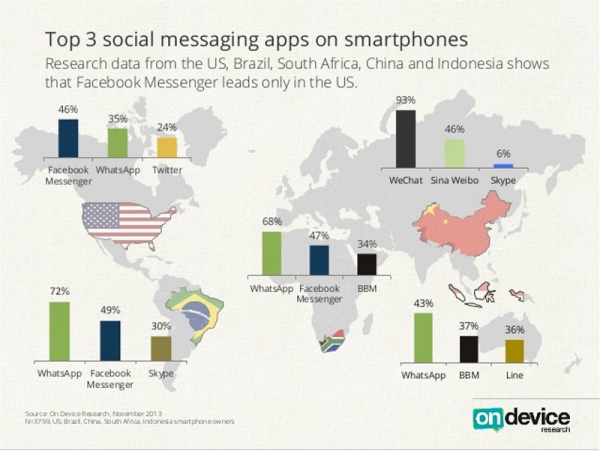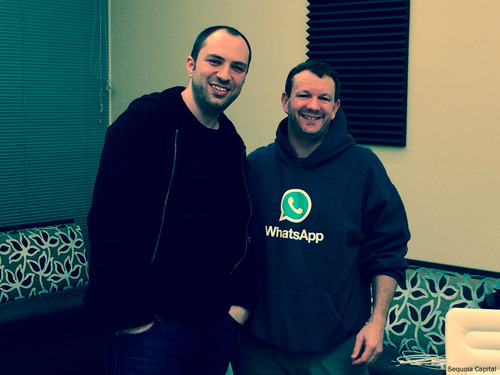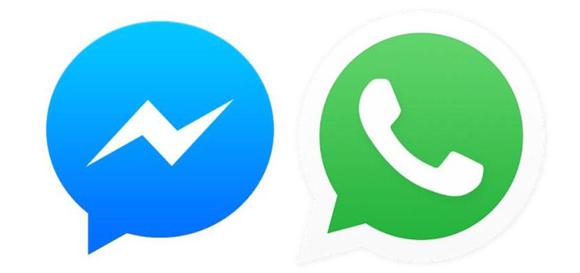Many people will be wondering: What is the difference between Facebook Messenger and WhatsApp? After all, both solutions are easy-to-use messaging applications that are owned by the same company—Facebook.

Actually, there’s a world of difference between Facebook Messenger and WhatsApp , which are the world’s two most popular messaging applications. WhatsApp currently has around 900 million users, and Facebook Messengers has around 700 million users, according to London’s Daily Express. The third most popular messaging service, China’s WeChat, has around 600 million users, according to Statista.
Much of the difference comes from the background of the two solutions. WhatsApp originated as a standalone advertising messaging solution by two engineers from San Jose, California, Jan Koum and Brian Acton, in 2009. Facebook Messenger was a tool created as an addition to the popular social network.
Originally you had to have a Facebook page to use Messenger, although it is now available as a standalone app. Anybody can download WhatsApp from the App Store, Google Play, or the Windows Store for 99¢ USD. One reason why WhatsApp is so popular is that it is a standalone solution with no strings attached.
So Which Is Better, Facebook Messenger or WhatsApp?
Most users note that WhatsApp is actually a better solution than Facebook Messenger. Kris Carlon of the AndroidPIT blog noted that WhatsApp has fewer bugs, and it is very easy to use.
All you need to use WhatsApp is a telephone number. It is also very easy to find and reach contacts using WhatsApp because it is based on phone numbers. If a person has a phone and a messaging service, WhatsApp can reach her or him.
Since it is not linked to a larger service, WhatsApp will not offend people that dislike Facebook or those that do not use Facebook. WhatsApp can also reach people all over the world, which is one reason why it is so popular.
WhatsApp is also very secure; Wired even claimed that its security system, called Textsecure, is “practically uncrackable.” Facebook has had a long history of serious security problems; as recently as March 2015 Computing UK reported that two Facebook security flaws allowed bad guys to get control of users’ computers. Security researcher David Sopas told Computing UK that he believes millions of Facebook users could be affected by the flaw.
WhatsApp also has fewer bugs and technical problems because it is a very well-run app, Carlon noted. One reason for this is that messaging is WhatsApp’s only business; messaging is very much a sideline for Facebook even though it is a growing part of that company’s business.

Jan Koum and Brian Acton
A final attraction to WhatsApp is the lack of advertising. Koum and Acton famously hate ads and have gone out of their way to keep them off their service. This makes WhatsApp a very clean solution. Facebook CEO Mark Zuckerberg has also said that ads are not the way to monetize WhatsApp. Last year Zuckerberg told analysts that he wants to keep expanding the company and look for other money-making opportunities in the future.
Most likely Zuckerberg feels that financial transactions or ecommerce would be a better means of cashing in on WhatsApp’s users. WeChat’s owner, Tencent, has made around $1 billion in transaction fees on money transfers and purchases done through the app.
WhatsApp Vs. Facebook Messenger
The biggest and most obvious advantage to Facebook Messenger is its integration with Facebook. A person can use it to send messages, video, pictures, and audio from a Facebook page to members of his or her group.
That being said, there are a lot of problems with Messenger. Many of its users report that it simply does not work with many Internet connections. It can often be very hard to get Facebook Messenger, which defeats the purpose of instant messaging in the first place.

Another big complaint with Facebook Messenger is that it can be very hard to log out. A person has to go to Settings>Applications>Manage Applications, open Messenger and Clear Data to log out of it. This means that once you are logged into messenger you are logged in.
Some users also report that it is hard to fully disable notifications. This means a person can be spammed. Sadly enough, one of the most aggressive spammers appears to be Facebook itself which is constantly sending invitations to get your friends to sign up.
A major problem with spam is that it makes you very vulnerable for cyberattacks, including phishing, in which a bad guy sends you a fake message. The fake message contains malware that takes over your phone or steals your data.
WhatsApp Is the Better Messaging App
Currently WhatsApp is a better pure messaging app than Facebook’s offering. If you just want to send text messages and other data to friends and family, WhatsApp is certainly the better solution. It is more secure and easier to use, and it actually works.

Although, those that want to rely upon Facebook as their primary communications medium will be better served by Messenger. Messenger would also be better for those that are seeking a means of driving traffic to a Facebook page and attracting more likes.
Persons that value security will definitely be better served by WhatsApp, although its safety is far from perfect. One reason why WhatsApp is more secure is that it is not connected to a larger service like Messenger is.
What the Future Holds for WhatsApp and Facebook Messenger
Both WhatsApp and Facebook Messenger will keep growing in popularity. The capabilities of both services will probably be expanded in the future.
Both services now allow users to send audio and video messages and to make phone calls. New capabilities recently added include video calling and voice mail.
Beyond those capabilities, the next frontier is financial services, particularly money transfers and payments. Expect tools similar to PayPal’s Venmo, a popular app that allows people to send money to friends and family, or Apple Pay, which enables users to make payments from bank accounts and credit card balances with their phones, to be added to both services.
The nature of these solutions is not clear yet, but they will be the most likely means of monetizing WhatsApp and Messenger. Other potential additions might include a taxi service like Uber and some sort of ecommerce solution similar to Amazon.com.
One thing is certain: Both Facebook Messenger and WhatsApp are here to stay, and both will grow dramatically in popularity in the years ahead.
